Get ready to be inspired! We’re counting down the top 10 greatest soccer players of all time – icons who revolutionized the sport and left an everlasting legacy.
Soccer, known as football in much of the world, isn’t just a game—it’s a global passion that has given rise to some of the most iconic athletes in sports history.
As fans, we often engage in spirited debates about who the greatest soccer players of all time are, comparing eras, styles, and the impact players have had both on and off the pitch.
In this blog post, we dive into the careers of the top 10 greatest soccer players of all time, exploring their achievements, unique skills, and the unforgettable moments that have immortalized them in the hearts of fans around the world.
Athletes’ achievements and outstanding performance on the field are usually reflected in soccer medals. There are various types of soccer medals with customized designs.
By producing personalized elements, these medals can be used to reward and celebrate players, coaches, and teams for their achievements during the soccer season.
From Pelé’s dazzling performances to Messi’s incredible dribbling and Ronaldo’s goal-scoring prowess, join us as we celebrate these remarkable athletes whose legacies are woven into the very fabric of soccer history.
Top 10 Greatest Soccer Players Of All Time
10 Ronaldinho

Ronaldinho, whose full name is Ronaldo de Assis Moreira, is often remembered not just for his achievements in soccer but for the sheer joy and creativity he brought to the game.
With a smile that lit up stadiums, Ronaldinho played with a flair and an infectious spirit that made him a favorite among fans worldwide.
Born in Porto Alegre, Brazil, Ronaldinho quickly rose through the ranks of local clubs, showing early on that he was destined for greatness.
His breakthrough came during his time at Paris Saint-Germain, but it was at FC Barcelona where he truly became a global icon. His arrival at Barça marked the beginning of one of the most successful eras in the club’s history.
Ronaldinho was a virtuoso on the field, known for his incredible dribbling ability, precise passing, and phenomenal vision.
He had a unique style characterized by no-look passes, overhead flicks, and audacious dribbles that could outwit even the tightest defenses.
His trademark move, the ‘elastico’, bamboozled opponents and became a staple highlight in soccer compilations around the world.
Among Ronaldinho’s numerous accolades, two stand out: the FIFA World Player of the Year, which he won twice in 2004 and 2005, and his instrumental role in securing the 2002 FIFA World Cup for Brazil.
His tenure at Barcelona also saw him winning the UEFA Champions League in 2006, a testament to his impact at the highest level of club football.
Ronaldinho’s influence extends beyond trophies and titles. He is credited with popularizing street-style play in professional soccer, inspiring a generation to embrace flair and creativity.
His legacy is not just in the records he set or the matches he won, but in the way, he played the game—with a smile, with joy, and with an undeniable magic that reminded everyone why they fell in love with soccer in the first place.
Ronaldinho retired from professional soccer in 2018, but his legacy endures, and his style continues to inspire young players and fans around the globe. He remains a beloved figure in the sport, a true ambassador of the beautiful game’s joyful spirit.
9 Zinedine Zidane
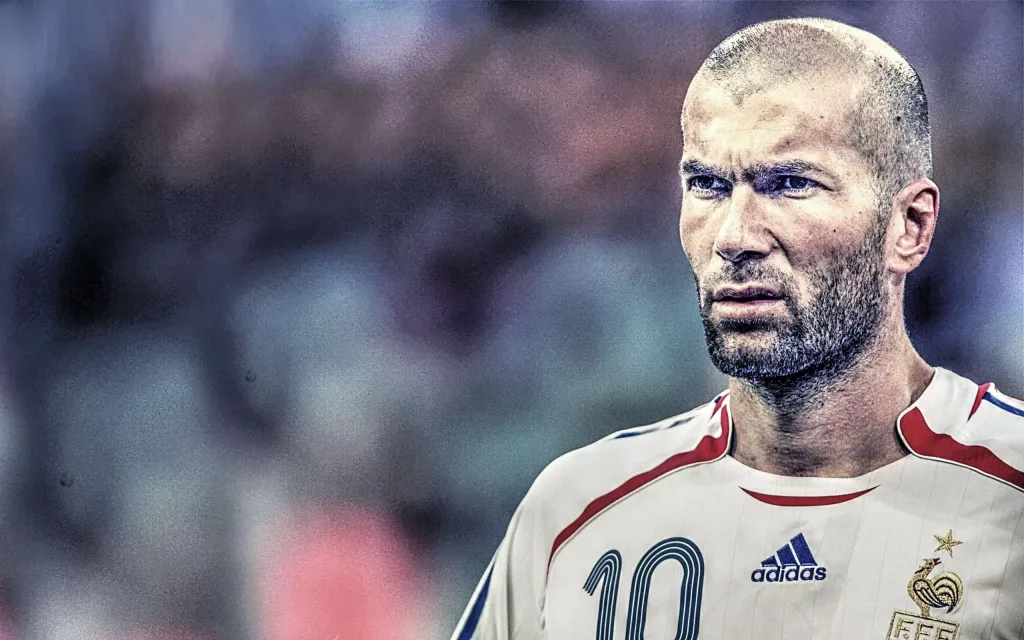
Zinedine Zidane, affectionately known as “Zizou”, occupies a rarefied space in the pantheon of soccer legends, revered not only for his unparalleled skill but for his calm demeanor and tactical intelligence on the field.
A maestro in the midfield, Zidane’s career is punctuated with moments of sheer brilliance that have left an indelible mark on the sport.
His talent was undeniable from an early age, and he quickly made his way through the ranks to become one of Europe’s most celebrated players.
Zidane’s elegance and vision came to define a generation of French soccer, culminating in his pivotal role in France’s 1998 World Cup victory on home soil.
Zidane was known for his exceptional ball control, precise passing, and ability to read the game several moves ahead of his opponents.
His play was characterized by a graceful yet powerful style, often using his signature ‘La Roulette’ move to spin past challengers. His vision allowed him to exploit spaces on the pitch that seemed invisible to others, making him a formidable playmaker.
Zidane’s list of accolades is extensive, including being named FIFA World Player of the Year three times.
He led Real Madrid to an unforgettable victory in the 2002 UEFA Champions League final with a stunning volley that is still hailed as one of the greatest goals in the history of the competition.
However, it was the 1998 World Cup where he cemented his legacy, scoring twice in the final against Brazil to help France lift the trophy for the first time.
Zidane’s impact on soccer extends beyond his playing days. As a coach, he has guided Real Madrid to three consecutive Champions League titles, a feat unmatched in the modern era.
His approach to coaching, much like his playing style, emphasizes strategic insight and maintaining composure under pressure, traits that have made him one of the most respected figures in the sport.
Zidane’s influence is felt not only in the trophies he won or the matches he dominated but also in the elegance and intelligence he brought to the midfield. His career is a testament to the artistry and beauty that soccer can embody, making him a true icon of the sport.
8 Ronaldo Nazario

Ronaldo dubbed “O Fenômeno” (The Phenomenon), is one of soccer’s most formidable strikers, known for his blistering pace, fearsome power, and clinical finishing.
His professional journey began with Cruzeiro, where his goal-scoring prowess quickly attracted the attention of Europe’s top clubs.
Spells at PSV Eindhoven and Barcelona showcased his lethal striking ability, but it was at Inter Milan and later Real Madrid where his legacy was cemented.
Ronaldo was a complete forward, combining technical skill with physical prowess. He possessed a remarkable ability to dribble at speed and maintain control of the ball, making him nearly unstoppable at full stride.
His trademark move, the step-over, left countless defenders bewildered. Ronaldo’s style was characterized by a direct approach to goal, utilizing his explosive acceleration to break away from defenders and his composure to finish under pressure.
Ronaldo’s career highlights are numerous, but perhaps none more significant than his performances on the international stage with Brazil.
He was a crucial part of the team that won the 1994 FIFA World Cup, although he did not play.
His redemption came in the 2002 World Cup, where he led the tournament in goals and helped Brazil clinch their fifth title, an incredible comeback following his injury struggles before the tournament.
In club football, Ronaldo’s accolades include two Ballon d’Or awards (1997 and 2002). His seasons at Barcelona and Inter Milan were particularly memorable, with a stunning 47 goals in 49 games for Barcelona during the 1996-97 season and prolific scoring at Inter despite battling knee injuries.
He transformed the role of the modern striker, blending speed, technique, and physicality. Young players still look up to him as the gold standard of what a forward should be capable of, both in terms of skill and mental fortitude.
His journey from young talent in Rio to a world-beating phenomenon illustrates the profound impact a single player can have on the global stage of soccer.
7 Ferenc Puskas
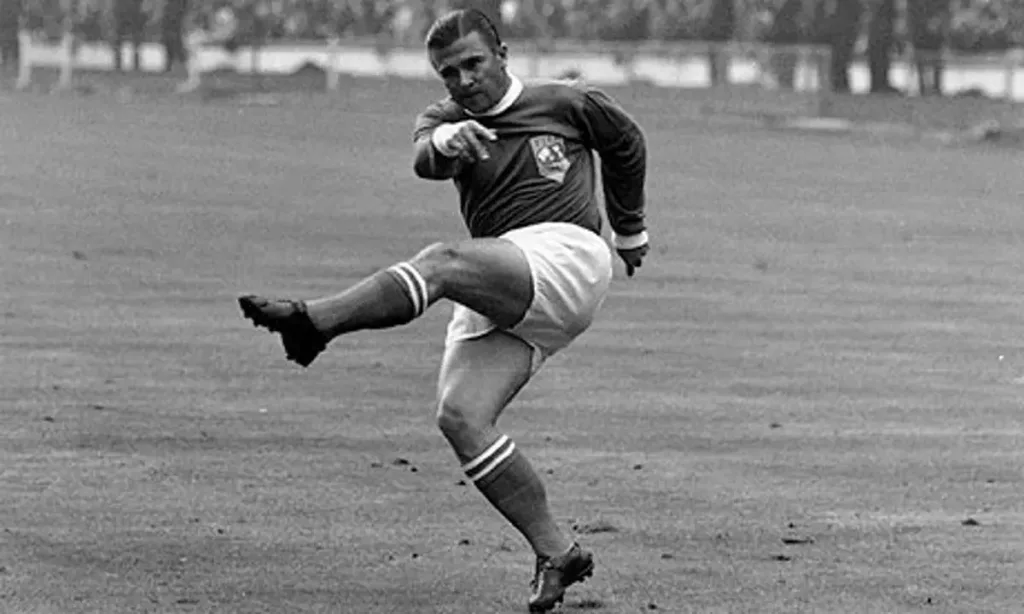
Ferenc Puskás, one of the most prolific goal scorers in the history of soccer, remains a towering figure in the world of sports decades after his playing career ended.
Known affectionately as “The Galloping Major” due to his early career in the Hungarian army team, Puskás’ legendary left foot left an indelible mark on international and club football.
Born in Budapest, Hungary, Puskás began his career with Kispest AC, which later became Honvéd as it was taken over by the Hungarian Ministry of Defence.
It was here that he developed into a fearsome forward, leading his team to multiple Hungarian league titles.
Puskás was also a key member of the Hungarian national team, famously known as the “Mighty Magyars,” a squad that dominated international soccer in the early 1950s.
Puskás was renowned for his incredible scoring ability, exceptional technique, and strategic vision. Although not the fastest, his intelligence on the field and superb positional sense allowed him to find spaces where others saw none.
His left foot was feared around the world, capable of delivering powerful shots from seemingly impossible angles.
Among his numerous accolades, Puskás’ most memorable moments came from the international stage and his tenure at Real Madrid. He scored an astonishing 84 goals in 85 international matches for Hungary and led them to the 1954 World Cup final.
After a political uprising in Hungary, he emigrated to Spain, where he joined Real Madrid and formed an iconic partnership with Alfredo Di Stéfano. During his time at Real Madrid, he won five consecutive league titles and three European Cups.
Puskás’ name is perhaps most enduringly commemorated in the FIFA Puskás Award, established to honor the player—male or female—who has scored the “most beautiful” goal of the year, a fitting tribute to a player who produced countless spectacular moments on the pitch.
His story is a powerful narrative of resilience and adaptability—shining in Hungary, reinventing himself in Spain, and becoming a beloved figure in the annals of soccer history.
Through his awe-inspiring performances and indomitable spirit, Puskás has become a permanent fixture in the conversation about the greatest footballers of all time, inspiring future generations to chase greatness with the same fervor and passion he displayed throughout his illustrious career.
6 Johan Cruyff

Johan Cruyff is a name that resonates deeply not only among soccer aficionados but also within the broader scope of sports history, recognized for his profound influence as both a player and a thinker.
Known for his intelligence on the pitch and his philosophical approach to the game, Cruyff embodied the essence of total football—a style he would later instill as a coach to transform the face of modern soccer.
His technical skills, speed, and tactical acuity helped Ajax dominate Dutch football and achieve success in Europe. Cruyff was central to Ajax winning three consecutive European Cups from 1971 to 1973.
Cruyff was famed for his agility, precise control, and spatial awareness, which allowed him to maneuver through defenses with grace and ease.
His ability to anticipate play developments made him a formidable forward and a masterful playmaker. Perhaps his most famous maneuver, the “Cruyff Turn,” remains a fundamental skill taught in youth soccer programs worldwide.
Cruyff’s career is adorned with numerous accolades and memorable moments. After his successful stint at Ajax, he moved to Barcelona, where he continued to shine and helped the club win La Liga in 1974—their first in 14 years.
Internationally, Cruyff led the Netherlands to the final of the 1974 World Cup, where they were runners-up, but his performances left a lasting legacy and introduced the world to the concept of “Total Football.”
Beyond his playing days, Cruyff’s philosophy and style profoundly influenced the game. As a manager, he laid the groundwork for the modern Barcelona footballing dynasty, championing an attacking, possession-based style that has since become the club’s hallmark.
His influence is evident in the philosophies of many of today’s top managers, who regard him as a seminal figure in the evolution of soccer tactics.
Johan Cruyff’s legacy is not just in the trophies he won or the skills he displayed but in his enduring impact on soccer’s tactical development.
He revolutionized football thinking with his deep understanding of the game, earning him a place as one of the true pioneers of modern soccer.
His visionary approach continues to inspire coaches and players alike, ensuring his place in the annals of soccer history as more than just a player but a true architect of the beautiful game.
5 Alfredo Di Stefano
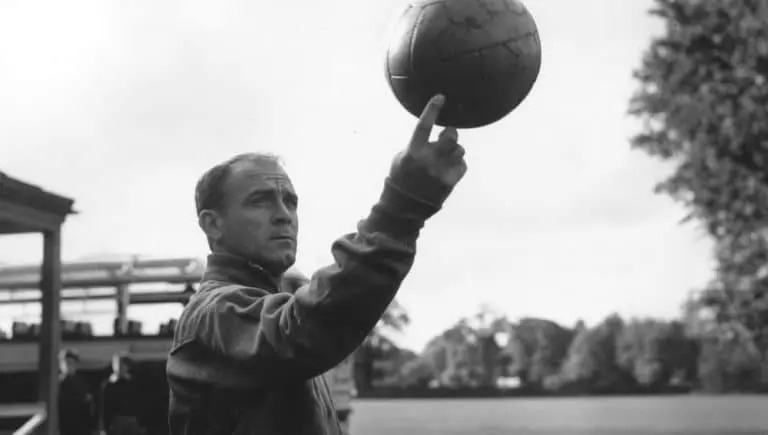
Alfredo Di Stefano, known as “La Saeta Rubia” (The Blonde Arrow), stands as one of football’s most versatile and influential figures.
His astounding career spanned two continents and multiple clubs, but he is most famously associated with Real Madrid, where he left a legacy as one of the greatest footballers of all time.
His performances in Bogotá caught the attention of European clubs, and he eventually joined Real Madrid in 1953. Di Stefano also had a unique international career, representing three different national teams: Argentina, Colombia, and Spain.
He was not confined to a single role; instead, he roamed the pitch, influencing the game from multiple positions. His ability to appear in the right place at the right time was uncanny, and his all-around skill set made him a formidable opponent in any footballing challenge.
During his illustrious time at Real Madrid, Di Stefano led the team to an incredible five consecutive European Cups from 1956 to 1960.
He scored in each of the finals, showcasing his knack for performing in crucial games. His partnership with Ferenc Puskas is legendary, forming one of the most feared attacking duos in football history. Di Stefano won numerous La Liga titles and was twice awarded the Ballon d’Or, in 1957 and 1959.
Di Stefano’s impact on Real Madrid and football as a whole is profound. He was instrumental in establishing Real Madrid as a powerhouse in European football, setting standards that the club still strives to uphold.
His tactical flexibility and physical endurance revolutionized the way football was played, making him a pioneer as much as a player.
He is often credited with instilling a winning mentality at the club, and his influence is palpable in the ongoing success and global prestige of Real Madrid.
As a testament to his enduring influence, the club’s training facility is named Ciudad Deportiva Alfredo Di Stefano, a fitting tribute to a player who was much more than just a forward but a true maestro of the beautiful game.
4 Cristiano Ronaldo

Cristiano Ronaldo is not just a soccer player; he is a global icon whose name is synonymous with dedication, excellence, and success.
Comprehended for his incredible athleticism and clinical goal-scoring ability, Ronaldo has consistently performed at the pinnacle of the sport, breaking records and setting new benchmarks across his storied career.
He moved from local clubs to Sporting Lisbon, where his remarkable performances caught the attention of top European clubs.
In 2003, he signed with Manchester United, beginning his rise to global stardom. Under the guidance of Sir Alex Ferguson, Ronaldo developed into a formidable forward, known for his speed, skill, and unparalleled work ethic.
Ronaldo’s famous free-kicks, characterized by their power and dip, have become his trademark. Over the years, his game has evolved from a flamboyant winger at Manchester United to a prolific forward at Real Madrid and later Juventus.
Ronaldo’s career is laden with individual and team accolades. He has won five Ballon d’Or awards and has numerous league titles across England, Spain, and Italy.
His time at Real Madrid was particularly fruitful; he won four Champions League titles with the club, including three consecutively from 2016 to 2018.
Ronaldo has also left a significant mark on international football, leading Portugal to victory in Euro 2016 and the 2019 UEFA Nations League, further cementing his status as a national hero.
Ronaldo’s meticulous attention to training and preparation has set new standards for athletic performance in soccer. He has inspired countless young athletes to pursue excellence with the same fervor and discipline he exhibits.
As he continues to play at the highest level, even in the latter stages of his career, Ronaldo’s legacy as one of the greatest footballers of all time is undeniable.
His journey from a small island in Portugal to the zenith of world football is a testament to his relentless pursuit of greatness. Cristiano Ronaldo is number 4 in our list of top 10 greatest soccer players of all time.
3 Diego Maradona
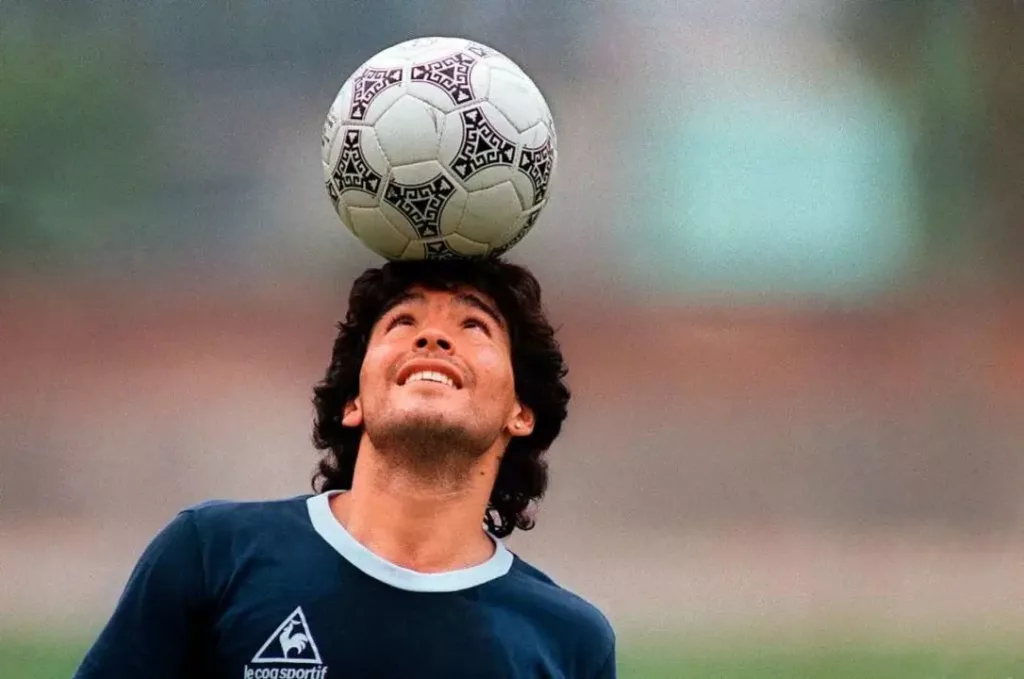
Diego Maradona, one of soccer’s most enigmatic figures, is celebrated not just for his unparalleled skill and flair but also for his dramatic and controversial career.
He made his professional debut at just 15 years old with Argentinos Juniors and quickly became one of the most sought-after players in the world.
His move to Boca Juniors and subsequently to Barcelona and Napoli marked the progression of a star who was destined to leave a significant mark on the world stage.
Maradona was known for his astonishing dribbling ability, quick feet, and incredible vision. His low center of gravity made it difficult for defenders to dispossess him, and his knack for performing in crucial games made him a formidable opponent.
Maradona’s play was characterized by boldness and creativity; he often took risks on the field that few others would dare, playing with a mix of street soccer spontaneity and professional precision.
Maradona’s career is punctuated with memorable highlights, none more so than the 1986 World Cup, where he captained Argentina to victory.
In the quarter-final against England, he scored two of the most famous goals in the history of the tournament: the first, known as the “Hand of God,” saw him punch the ball into the net; the second, later voted the “Goal of the Century,” involved him dribbling past five England players to score.
At the club level, his time at Napoli is legendary, where he led the team to their first-ever Serie A Italian Championships in 1987 and 1990.
Despite the controversies, Maradona’s genius on the soccer field is undisputed. He remains a beloved figure in the sport, revered for his extraordinary skill and the sheer audacity of his play.
Maradona is often cited as one of the greatest, if not the greatest, soccer players of all time. His death in 2020 was mourned worldwide, a testament to his lasting impact and the global love for his rebellious genius and footballing artistry.
2 Pele
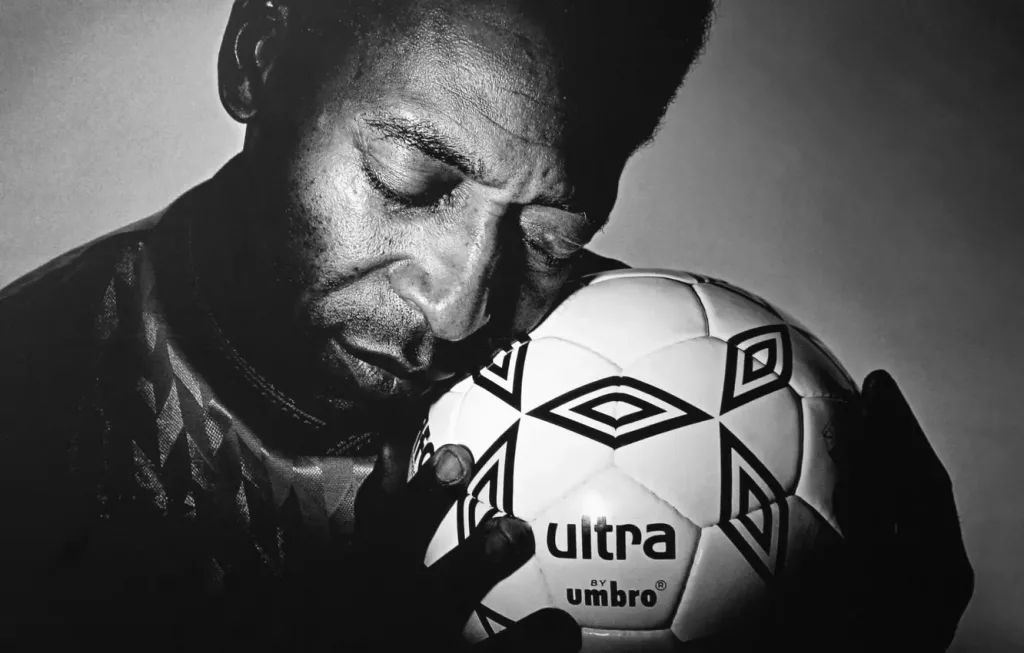
Pelé is universally recognized not just as one of the greatest footballers of all time, but as a true icon of the sport. His impact is monumental, having set standards and records that still stand today.
Pelé began his professional career at Santos FC at just 15 years old and quickly became a global sensation.
His extraordinary ability to score from almost anywhere on the field, combined with his unmatched vision and skill, made him a star both in Brazil and internationally.
Pelé’s charisma and sportsmanship helped popularize soccer around the world, especially in countries where it was not as dominant.
He possessed an exceptional understanding of the game, which, when combined with his athleticism and intelligence, allowed him to dominate on the international stage.
His play was marked by a combination of technical skills, creativity, and an innate sense of spatial awareness, which often left defenders and goalkeepers bewildered.
Pelé’s list of accolades is extensive. He is the only player to have won three FIFA World Cups (1958, 1962, and 1970), a feat that has yet to be matched.
Throughout his career, he scored a staggering total of over 1,000 professional goals, making him one of the most prolific goal scorers in football history. At the club level, he led Santos FC to multiple national and international titles, including two Copa Libertadores.
He transformed football into a global spectacle, bringing it to the masses and inspiring generations of players and fans alike.
His outreach and humanitarian efforts have made him a global ambassador for sport and peace. He has been a vocal advocate for overcoming poverty and an influential figure in using sports as a force for good.
His name remains a byword for excellence in football, and his status as a legend continues to inspire awe and respect long after his retirement. Pelé is not just a footballer; he is a symbol of the beautiful game’s power to inspire and unite people across the world.
1 Lionel Messi
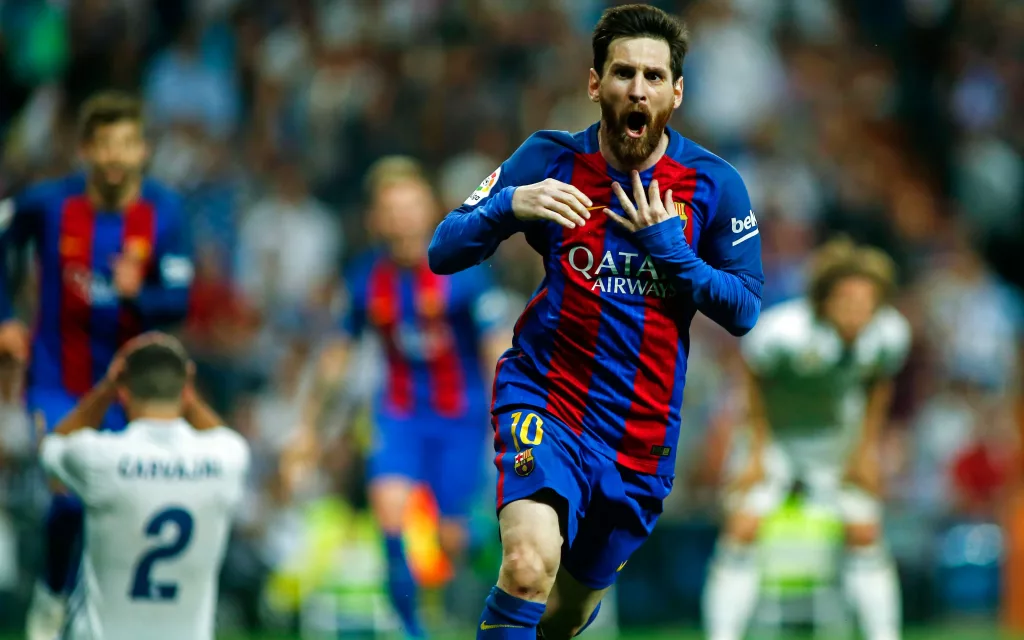
Lionel Messi, often simply referred to as “Messi,” is a name that stands out in the world of modern football for his extraordinary skill, consistency, and dedication to the sport.
Widely regarded as one of the greatest footballers of all time, Messi’s career has been characterized by his magical play, countless records, and the ability to make the impossible seem routine.
His debut for the first team came at just 17, marking the beginning of what would be one of the most illustrious careers in football history. Messi’s connection with Barcelona grew deep, and he became the cornerstone of the club’s success for over two decades.
Messi is well-known for his incredible dribbling ability, precision passing, and clinical finishing. His low center of gravity, coupled with extraordinary balance and agility, allows him to maneuver through tight spaces and past multiple defenders with ease.
Messi’s vision and intelligence make him an exceptional playmaker, and his left foot is one of the most potent in the history of the sport.
Messi’s trophy cabinet is overflowing, highlighted by multiple FIFA Ballon d’Or awards, which he has won a record number of times.
His tenure at Barcelona was marked by numerous domestic titles, including 10 La Liga titles and 7 Copa del Rey victories. Internationally, Messi led Argentina to victory in the 2021 Copa América, his first major international trophy, and also won the 2008 Olympic gold medal.
At Barcelona, he was instrumental in winning four UEFA Champions League titles. His scoring records are just as impressive, being Barcelona’s all-time leading scorer and having the most goals by a player for a single club.
Messi’s rivalry with Cristiano Ronaldo, another contemporary great, has been a defining feature of his career, pushing both to greater heights.
His humble demeanor and extraordinary talent have endeared him to millions, transcending the sport. Messi’s legacy is not just built on his astonishing numbers but also on the style and the beauty of his play, which has captivated fans around the world.
Now that the Argentine superstar plays in Major League Soccer with Inter Miami, it is expected that his presence and overall influence will improve the followership of the game in the United States.
The American public will likely be more drawn to Soccer because of his reputation and talents. And for those who like to take a punt or two, smart money will be on Messi to lead the Miami franchise to a few trophies in the coming years.
For those who like to put their money where their mouth is, there is good value on Inter Miami to win the title at the end of the season. Beyond the potential returns, there are various soccer betting offers to take advantage of before the end of the season.
Disclosure: Our content is reader-supported. If you click on certain links we may make a commission. Learn More.
Discover more from Sportshubnet
Subscribe to get the latest posts sent to your email.




